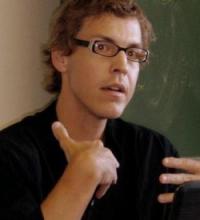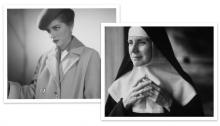Vocation

I was a nervous kid. Once, I got so freaked out by the prospect of a speaking part in my first-grade school play that my folks thought I had come down with appendicitis. But there were two times in particular that I remember descending into unmitigated panic. Both involved discussions with my dad about my career.
The first time, my dad was telling me about his year-by-year earning trends as an insurance salesman. He went from being one of several agents manning a booth in a Sears store to being the highest-earning employee in his major international company over about 15 years. He added zeroes to his income, and a passel of staffers, including my mom for a while (didn’t work out so well – they divorced thereafter).
At his height, he was earning upwards of half a million a year, and this was in the 80s. His company flew him all over the world, showered him with awards, and held him up as the high-water mark for all other agents to aspire to. I combined this remarkable achievement with the implicit cultural message that all generations exceeded their parents in earning power and went into an emotional tailspin.
How in the hell was I going to make that kind of money?

I’ve been asked how I knew I was called to be a writer. For me, calling is fairly easy to recognize. If the thought of doing something fills you with equal parts joy and terror, it’s probably a calling.
There’s more to it than that, I suppose, since the idea of buying a new Tesla sports car fills me with both feelings too, mostly because my wife, Amy, would kill me. There are other elements, like the conviction that our calling should feel something of an identifiable need in the world, and that it should call on gifts we have in a way that is life-giving not just to others, but joyful and life-affirming for us as well.
But the joy and terror thing is a pretty good sign you’re on the right track.

It was December of 2000, but I remember the occasion as if it were yesterday.
It was a few days after Christmas during my senior year of college. I was quite nervous, and I wondered how my friends and family would react.
How would my basketball teammates respond? Would my roommates treat me differently? And of course, what about my girlfriend? She had no idea our relationship would take such a dramatic turn.
I could hide no longer. I had to be honest with who I was. And so, after a great deal of delay and long nights of nervous planning, I finally decided to share what I had been keeping secret.
Beginning with my girlfriend, then my parents, brother, sister, and eventually friends, roommates, and teammates, I shared the news: After a significant amount of prayer and discernment, I was no longer planning to attend law school following college graduation, but instead, I wanted to attend seminary in order to become an ordained Lutheran pastor.
As to be expected, I received mixed reactions.
My parents were confused and surprised, as they – like most people – had not perceived me as “religious”," especially not to the point of pursuing ordination. Nevertheless, they accepted the news with delight and affirmation.
In addition, my girlfriend (who is now my wife) was wonderfully supportive. So was my brother, sister, and closest friends.
On the other hand, some others were not sure how to react. My friends – mostly uninterested in religion – wondered about future plans. Basketball teammates were a bit uneasy. And even the campus priest and a few professors had an assortment of reactions. While a number of people were anxious and apprehensive, those within my closest circle of friends accepted the announcement with open arms.
I continue to thank God for such a wonderful web of support.

An open letter to my beloved sons, in whom I am well pleased,
I'm writing this fatherly letter about the difference between a career and a vocation. I learned this wisdom from Jim Forest, an old man who was a famous peace activist in the 1960s and walked many of the top spiritual activists of the 20th century. He personally taught me some important lessons on vocation that might be very helpful to you, and he specifically had you three in mind when he shared this.
When I say "career," I mean the idea of a job that you work at to make money, get promotions, become an expert, and eventually retire and earn a pension. There's nothing really wrong with having a career, or even a few careers. For example, you could say I was a "career pastor" for 20 years.
But there is something more important that we call a "vocation." A vocation may also include getting a paycheck and going to a workplace, but there is much more. A vocation is a "calling" that can span over many careers. For example, I think by vocation I am called to teach. I did that as a youth pastor, a church-planter, a college teacher, a seminar facilitator, an author, and a publisher. All of those mini-careers are just the platform I used to live out my calling.

A FEW YEARS back, Sojourners editor-in-chief Jim Wallis and I did a talk together at Northwestern University. After the event, the line to see Jim was dozens of people long. They wanted him to sign their books, to offer encouragement on their new social justice projects, to meet their kids, to give pastoral advice on a problem they were having. Jim talked to each and every one of them, some for several minutes. It delayed our dinner by at least an hour.
As we were finally sitting down in the restaurant and tucking in to our salads, I asked Jim why he stayed for so long. Why not do what so many other public figures do—leave right after your part of the show is over?
“I am a preacher and a pastor,” he answered. “An important part of my vocation is spending loving time with individuals. The period right after a public talk is an excellent opportunity to do that.”
“Plus,” he added, with a twinkle in his eye, “listening to other people’s stories may be the best part of this work.”
I just hit the 10-year mark of running Interfaith Youth Core, and the 15-year point of my first involvement with interfaith work. I haven’t logged as many miles or given as many speeches as Jim, but my schedule tends in a similar direction. The image of him talking to all those young people after that event at Northwestern sticks in my mind every time I board an early flight or prepare for a day of workshops followed by a late-night keynote.

I want to tell you the story of one brave woman who has given her life to live in the East Garfield Park neighborhood of Chicago.
Arloa Sutter is one of my new heroes. Let me tell you why.
I met Arloa through the Redbud Writers Guild to which we both belong. Last month I had the honor of meeting her at our guild retreat. I had no idea what a culture rebel she was.
Arloa didn't begin her days of serving the inner-city poor as the grandmother she is today, but as a young woman. It all began with her church staff not knowing what to do with the many people who came into the building during the week needing assistance. Instead of pushing them out the door, she created a storefront room that provided food,l friendly conversation and a hot cup of coffee to those wishing to escape the cold. This eventually evolved into her gathering a board of directors to form Breakthrough Ministries in 1992.
She didn’t know what she was doing, but she did it anyways. I love gutsy people like that.

I feel very honored to be invited by this class to give this commencement address, and I asked about the make-up of your class. Most of you, I am told, are going right into the church, or are already there— to ordained ministry and other missions of the church.
So I want to speak directly to you about the vocation of the church in the world. Let me start with a baseball story. I have been a little league baseball coach for both my sons' teams over many years. And I’ve learned that baseball teaches us “lessons of life.”
Just a few weeks ago, our 9-year-old's team was down 5-0, and we had already lost our opening couple of games. It didn’t look good. But all of a sudden, our bats and our team came alive; and all the practice and preparation we had done suddenly showed itself. Best of all, our rally started in the bottom half of the order with our weakest hitters. Two kids got on with walks and our least experienced player went up to the plate. With international parents, Stefan had never played baseball before and you can tell he doesn’t have a clue. But somehow he hit the ball; it went into the outfield. Our first two runs scored and he ended up on second base. Being from a British Commonwealth culture, he began to walk over to the short stop and second baseman and shake their hands! “Stefan,” I shouted, “You have to stay on the base!” “Oh,” he said, “I’ve never been here before.”

I’ve moved five times in five years of marriage. My husband is a pastor. I am a journalist. He is forever discerning, forever visioning— I am forever antsy.
This latest move to Washington, D.C., led me to think a lot about the “call” to serve. My husband and I were dating, then engaged, then married during his four years at seminary. I suppose I knew what I was getting myself into. (Nope, not one little bit.)
During those years, it was drilled into my brain that even though I felt a “calling” as a writer, a storyteller, etc., it was extremely different from the call.
Read: What your husband is doing is more important than anything you will ever do in your lifetime — ever. Except maybe have his progeny, and then, still, it’s a toss-up.

Mother’s Day and today is a celebration of the role of my maternal life, a role that has proved to be more satisfying and blessed, which is closer to my heart, than writing or art or friendship or even marriage. The work and longing of a life-time, almost, has been invested in my children — the beings who had their start like seeds in my own body, who have bloomed and flourished, who overcame barriers and difficulties caused by my own parental inexperience or ignorance, who grew as I grew, who now have lives of significance, who are learning along with their own offspring, much as I did but in a far more swiftly changing world.
So there were pleasurable moments as I heard from all five individually. And flowers — yellow daisies and Queen Anne’s lace from Robin, my eldest. (It’s a favorite flower for us both. She and I remember back to her wedding to Mark, on an island in an Illinois forest preserve, when her wedding bouquet was made of those white lacy flowerets, exploding like fireworks.) I hope to use those delicate flowers as objects to write about when I talk about poetry at an elementary school next week.

NEW YORK CITY — Today and Wednesday, I have the privilege of attending a private gathering here in the SoHo neighborhood of Manhattan with Eugene Peterson, the 80-year-old theologian and prolific author best known for his para-translation of the Bible, The Message.
The two-day event, Q Practices, is part-retreat, part-seminar on the theme of how we might cultivate our inner lives in an age of epic distractions.
I'll be reporting more fully later, but wanted to share with you a few gems from Peterson, who recently published a marvelous memoir titled, simply, The Pastor, from this morning's sessions.
Peterson, who is a Presbyterian minister (now retired from the pastorate after 30 years), grew up in Montana in the Pentecostal Christian tradition. His mother, in fact, was a preacher who later founded and pastored her own church.

Growing up in Kuwait, Asif Balbale thought he wanted to become a chemical engineer. He never imagined enlisting in the U.S. Navy, much less becoming an imam.
Balbale got his engineering degree after immigrating to the U.S. at age 21. With jobs hard to come by, he tried to enlist in the Army, but didn't weigh enough. Instead, he met the Navy's minimum requirements.
He was sworn in as a U.S. citizen in 2005 while deployed aboard the USS Boxer. Intending to apply for an officer program, Balbale, 31, mistakenly emailed a recruiter for the chaplain corps.
"God, I think, had better plans for me," Balbale said, looking back.
And so it is for a number of military chaplains who, by twists of fate or perhaps divine Providence, found their calling to become chaplains while on active duty.

During her brief career as star of stage and screen in the late 1950s and early 1960s, Dolores Hart won a Theater World Award, was nominated for a Tony Award and gave Elvis Presley his first on-screen kiss (in the 1957 film Loving You) when she was just 19 years old.
Now 73-year-old Hart — better known for most of the last 40 years as Mother Dolores, Prioress of the Benedictine Abbey of Regina Laudis in Bethlehem, Conn. — has a new claim to fame: Oscar nominee.
Last week, God is the Bigger Elvis, a short documentary film about her journey from Hollywood starlet to cloistered Catholic nun, received an Academy Award nomination for best short documentary film.
Sojourners has always tried to understand and advocate for "biblical politics." But what does that mean now, especially as we approach another major election?
I was talking the other day to a Christian leader who has given his life to working with the poor. His approach is very grassroots -- he lives in a poor, virtually all-minority community and provides basic services for low-income people. He said, "If you work with and for the poor, you inevitably run into injustice." In other words, poverty isn't caused by accident. There are unjust systems and structures that create and perpetuate poverty and human suffering. And service alone is never enough; working to change both the attitudes and institutional arrangements that cause poverty is required.

Good presidents and administrators influence not just schools, but the broader church.
In a credit to both Republicans and Democrats, Congress just passed a measure that will avoid a government shutdown for at least the next two weeks. This means that there is still time to protect the poor and most vulnerable during the budget debate.